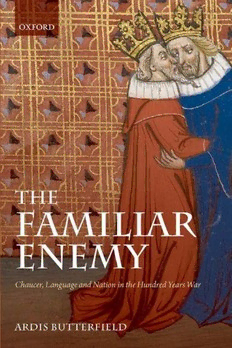
The Familiar Enemy: Chaucer, Language, and Nation in the Hundred Years War PDF
470 Pages·3.877 MB·
Most books are stored in the elastic cloud where traffic is expensive. For this reason, we have a limit on daily download.
Preview The Familiar Enemy: Chaucer, Language, and Nation in the Hundred Years War
Description:
Лингвистические, литературные, и культурные наследия Англии и Франции , во времена столетней войны, многоязычная культурная география средневековой Европы.В течение этой войны, два народа глубоко переплелись , таким образом , что современное понимание , что английский язык,в четырнадцатом столетии, не могло быть отделено от французского языка, и это имеет далеко идущие значениядля нашего понимания английского языка и англичан, и французского языка и французов. The Familiar Enemy re-examines the linguistic, literary, and cultural identities of England and France within the context of the Hundred Years War. During this war, two profoundly intertwined peoples developed complex strategies for expressing their aggressively intimate relationship. This special connection between the English and the French has endured into the modern period as a model for Western nationhood. Ardis Butterfield reassesses the concept of nation in this period through a wide-ranging discussion of writing produced in war, truce, or exile from the thirteenth to the fifteenth century, concluding with reflections on the retrospective views of this conflict created by the trials of Jeanne dArc and by Shakespeares Henry V. She considers authors writing in French, Anglo-Norman, English, and the comic tradition of Anglo-French jargon, including Machaut, Deschamps, Froissart, Chaucer, Gower, Charles dOrl#ans, as well as many lesser-known or anonymous works. Traditionally Chaucer has been seen as a quintessentially English author. This book argues that he needs to be resituated within the deeply francophone context, not only of England but the wider multilingual cultural geography of medieval Europe. It thus suggests that a modern understanding of what English might have meant in the fourteenth century cannot be separated from French, and that this has far-reaching implications both for our understanding of English and the English, and of French and the French.
See more
The list of books you might like
Most books are stored in the elastic cloud where traffic is expensive. For this reason, we have a limit on daily download.
